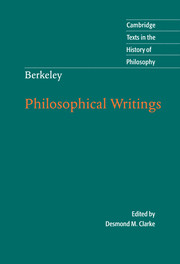
-
Select format
-
- Publisher:
- Cambridge University Press
- Publication date:
- 05 June 2012
- 22 January 2009
- ISBN:
- 9780511802577
- 9780521881357
- 9780521707626
- Dimensions:
- (228 x 152 mm)
- Weight & Pages:
- 0.74kg, 386 Pages
- Dimensions:
- (228 x 152 mm)
- Weight & Pages:
- 0.62kg, 386 Pages
- Subjects:
- Philosophy Texts, Philosophy
You may already have access via personal or institutional login- Subjects:
- Philosophy Texts, Philosophy
Book description
George Berkeley (1685–1753) was a university teacher, a missionary, and later a Church of Ireland bishop. The over-riding objective of his long philosophical career was to counteract objections to religious belief that resulted from new philosophies associated with the Scientific Revolution. Accordingly, he argued against scepticism and atheism in the Principles and the Three Dialogues; he rejected theories of force in the Essay on Motion; he offered a new theory of meaning for religious language in Alciphron; and he modified his earlier immaterialism in Siris by speculating about the body's influence on the soul. His radical empiricism and scientific instrumentalism, which rejected the claims of the sciences to provide a realistic interpretation of phenomena, are still influential today. This edition provides texts from the full range of Berkeley's contributions to philosophy, together with an introduction by Desmond M. Clarke that sets them in their historical and philosophical contexts.
Contents
Metrics
Full text views
Full text views help Loading metrics...
Loading metrics...
* Views captured on Cambridge Core between #date#. This data will be updated every 24 hours.
Usage data cannot currently be displayed.
Accessibility standard: Unknown
Why this information is here
This section outlines the accessibility features of this content - including support for screen readers, full keyboard navigation and high-contrast display options. This may not be relevant for you.
Accessibility Information
Accessibility compliance for the HTML of this book is currently unknown and may be updated in the future.


